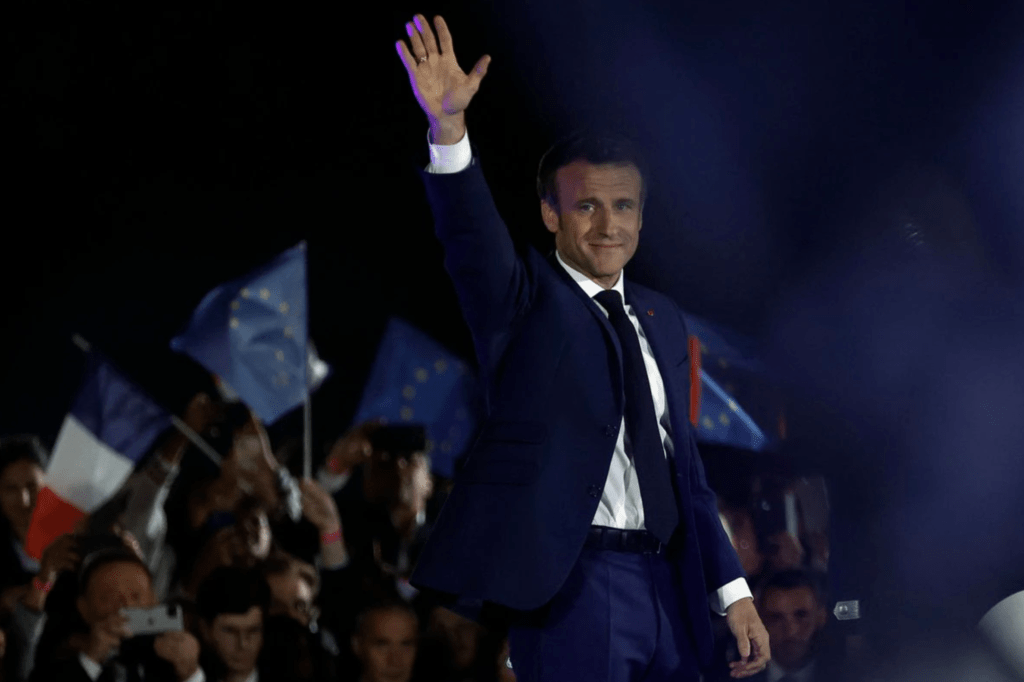Macron Wins as France Shuns the Far Right

Jeremy Kinsman
April 24, 2022
Emmanuel Macron’s win Sunday night with 58.8 percent of the presidential vote would be called a clear landslide in a democratic election anywhere else.
Cautionary reservations persist because Marine Le Pen’s share of the vote at 41.2 percent is a historic high in modern France for the extreme right, and a big gain from 2017’s match-up at 33.9 percent. Some suggest her higher score finally normalizes the far right’s political legitimacy, burying the French public’s taboo on its participation in government that has prevailed since the Liberation in 1944 crushed the collaborationist Vichy regime. Le Pen indeed claimed her higher score promises a bright future (though after two losses, it may be more likely under her cooler niece, Marion Maréchal).
As to significance for the “new international battlefield” (Gideon Rachman of the Financial Times) pitting internationalists against the nationalist, anti-globalist, anti-democracy club that includes Trump, Orban, Netanyahu, Bolsanaro, Duterte, and sundry others, with the partnership of Putin for sure and probably Xi Jinping, Marine Le Pen’s views would have dramatically tilted the balance. She is anti-EU, anti-NATO, and more or less accommodating to Russia. The media, burned from the Trump and Brexit surprises, had held out the possibility of a third seismic shock. No wonder leaders of Germany, Spain, and Portugal broke non-interference protocol by co-signing an op-ed last week describing Macron’s re-election vital for the EU. These international issues were not, however, top of French minds.
Le Pen owes her improvement of about 7 percent over her score in the 2017 run-off not to international issues, but to generalized unhappiness in France. The French have a habit of souring over their leaders, denying re-election to the last two presidents, Nicholas Sarkozy and François Hollande. American writer James Salter, who chronicled life in the 1950s from a table at La Coupole, put it down to the “old disease, difficult to cure, discontent.” She tried to make her party more mainstream, renaming the Front National founded by her holocaust-denying father Jean-Marie 50 years ago the “Rassemblement National” and kicking him out.
Macron has actually offered pretty good government over the last five years, if you go by the numbers. The French economy has done well, and his leadership on COVID-19 has been solid.
But underneath are features of mass (and class) identity discontent that gave Trump a path to the White House. The white discontent in France’s “periphery” that fuelled the “gilets jaunes” revolution these last few years was a rebellion of the resentful (not unlike Canada’s blockaders). French statistics don’t match higher US rates of opioid addiction and suicide, but some issues of identity pushback are vividly shared, notably on immigration, where Le Pen’s positions have been overtly Islamophobic.
Macron has actually offered pretty good government over the last five years, if you go by the numbers. The French economy has done well, and his leadership on COVID-19 has been solid.
Jihadist attacks against Charlie Hebdo and the Bataclan nightclub, made positions such as banning the wearing of headscarves in public appealing to many who were fed up with catering to “le wokeism” and minority identities, allegedly imported from the US. That Le Pen had been challenged from the farther right by xenophobic broadcast commentator Eric Zemmour amped up the resentment band width. The anti-government sentiment was profound, from the extreme left (Jean-Luc Melanchon) and the far right (Le Pen and Zemmour), garnering almost 60 percent of the vote in the first round two weeks ago.
The combined score in the first round of the two former mainstream parties, the Socialists (Paris Mayor Anne Hidalgo) and the Republicans (Valérie Pécresse was under 7 percent), Macron having eviscerated them in 2017. It is to his credit he has prevailed so convincingly against le Pen, given the mood, especially since his greatest vulnerability has been his own style which many resent as that of a privileged, remote elitist from Paris.
In June, he faces legislative elections. His own still-unrooted party (La République en Marche) may well lose its majority, in which case he will be in the position of “cohabitation” with a quasi-adversarial prime minister, to whom, however, the Fifth Republic assigns the harsh duties of running the economy and delivery of domestic services, leaving the president to spend the next five years positioning on EU and world affairs.
No wonder the music greeting Macron at his victory celebration in front of the Eiffel Tower was the EU hymn (Beethoven’s) “Ode to Joy.”
Given the dearth of great leaders in our democracies, circumstances now place Macron, whose ambitions can be Jupiterian, as the EU’s principal personality, in tandem with Germany’s Olaf Scholz.
We are all better off.
Contributing Writer Jeremy Kinsman has served as Canadian Ambassador to the EU, as well as High Commissioner to London, and Ambassador to Moscow and Rome. He is currently a Distinguished Fellow of the Canadian International Council.
